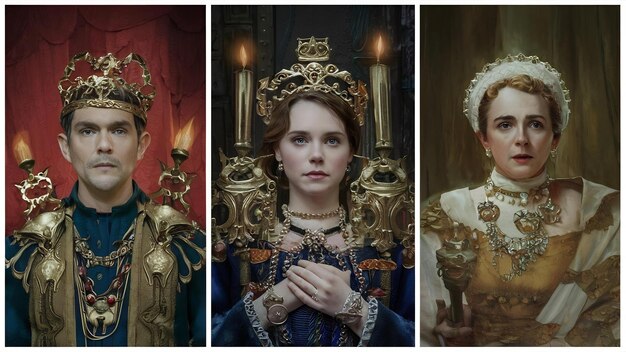Limited Series vs. Anthology Series: Know the Key Differences

Understanding the differences between limited series and anthology series is crucial before diving into your next binge-watch, as they offer distinct narrative structures and viewing experiences.
Diving into the world of television can be overwhelming, especially with the plethora of series available. Before you commit to your next binge-watch, it’s essential to understand the different types of shows out there. Two popular formats are the limited series vs. anthology series, each offering unique storytelling experiences that cater to different viewing preferences.
Limited Series vs. Anthology Series: What’s the Buzz About?
In recent years, television has evolved significantly, offering viewers a wide range of formats and storytelling styles. Among the most popular are limited series and anthology series. But what exactly sets them apart, and why should you care? Understanding the nuances can enhance your viewing experience, ensuring you choose a show that aligns with your preferences.
Defining Limited Series
A limited series tells a complete, self-contained story within a predetermined number of episodes. Unlike traditional TV shows that can run for multiple seasons, a limited series has a clear beginning, middle, and end, often based on a book or real-life event. Once the story is told, there are typically no plans for a second season.
Defining Anthology Series
On the other hand, an anthology series presents a different story each season, often with new characters and settings. While some anthology series might maintain a consistent theme or style across seasons, each installment is designed to be watched independently.

Here are some key differences in bullet points:
- Story Arc: Limited series have one story arc, while anthology series have a different story each season.
- Characters: Limited series feature the same characters throughout, whereas anthology series typically introduce new characters each season.
- Commitment: Limited series require a shorter time commitment compared to potentially long-running traditional series or anthology series with numerous seasons.
Ultimately, the choice between a limited series and an anthology series depends on what you’re looking for in a TV show. Are you in the mood for a brief, immersive story with a satisfying conclusion, or do you want the excitement of a new narrative each season?
Narrative Structure: A Deep Dive
The narrative structure is where limited series and anthology series truly diverge. Each format uses its unique structure to deliver a distinct storytelling experience, impacting everything from character development to overall pacing.
Limited Series: The Concise Narrative
Limited series are characterized by their focused and complete storylines. Because they have a pre-defined number of episodes, creators must craft a narrative that efficiently develops characters and resolves conflicts within that timeframe.
Anthology Series: Fresh Starts Every Season
Anthology series offer a refreshing approach with each season presenting a new, self-contained story. This allows writers to explore various themes, genres, and characters without the constraints of an ongoing narrative.

Consider these points comparing both forms of shows mentioned:
- Character Development: Limited series allow for in-depth character arcs, while anthology series offer a snapshot of characters within a specific story.
- Theme Exploration: Anthology series can delve into a wider range of themes, as each season is essentially a blank canvas.
- Pacing: Limited series tend to have a more deliberate pace, building towards a conclusive ending, whereas anthology series can vary widely in pacing, depending on the story being told.
In conclusion, both limited series and anthology series provide compelling narrative experiences, but they cater to different tastes. Limited series offer a complete, immersive story with depth, while anthology series provide variety and freshness with each new season.
Character Development: Immersion vs. Introduction
The way characters are developed in limited and anthology series plays a significant role in how viewers connect with the story. Each format offers unique advantages and challenges in terms of character depth and relatability.
Building Bonds in Limited Series
Limited series provide ample time to explore characters’ backstories, motivations, and relationships. This extended exposure allows viewers to form deep emotional connections, making their journeys more impactful.
New Faces in Anthology Series
Anthology series, on the other hand, introduce fresh characters each season. While there’s less time for in-depth development, this format allows for exploring a diverse range of personalities and experiences.
Take a closer look:
- Emotional Connection: Limited series often foster stronger emotional connections due to the extended time spent with characters.
- Diversity: Anthology series can showcase a wider variety of characters and perspectives, reflecting different cultures and backgrounds.
- Actor Flexibility: Anthology series provide actors with the opportunity to take on new roles each season, avoiding typecasting and showcasing their versatility.
Ultimately, whether you prefer the deep immersion of a limited series or the fresh perspectives of an anthology series, the characters drive the narrative and shape the viewing experience.
Commitment Level: Binge-Worthy or Bite-Sized?
One of the most practical considerations when choosing between a limited series and an anthology series is the time commitment involved. Depending on your schedule and viewing habits, one format may be more appealing than the other.
Limited Series: A Sprint, Not a Marathon
Limited series are designed to be watched in a relatively short period. With a predetermined number of episodes, you know exactly how much time you’ll need to invest to see the story through to its conclusion.
Anthology Series: Choose Your Own Adventure
Anthology series offer greater flexibility. You can pick and choose which seasons to watch based on your interests, without feeling obligated to follow a continuous storyline.
To summarise the benefits:
- Time Efficiency: Limited series are perfect for viewers who want a complete story without a long-term commitment.
- Flexibility: Anthology series allow you to explore different genres and themes at your own pace.
- Re-watchability: Both formats offer high re-watchability, whether you want to relive a favorite limited series or revisit a standout season of an anthology.
In the end, the ideal commitment level depends on your personal preferences and viewing habits. If you’re looking for a concise and satisfying experience, a limited series might be the way to go. If you prefer variety and flexibility, an anthology series could be a better fit.
Popular Examples: Spotlighting Success Stories
To further illustrate the differences between limited series and anthology series, let’s take a look at some popular examples that have garnered critical acclaim and captured audiences worldwide.
Iconic Limited Series
“The Queen’s Gambit” is a recent example of a limited series that captivated viewers with its compelling characters , and satisfying conclusion. Based on the novel by Walter Tevis, the series tells the story of Beth Harmon, a young orphan who becomes a chess prodigy.
“Chernobyl” offers a gripping and historically accurate portrayal of the 1986 nuclear disaster. With its intense atmosphere and compelling characters, the series is a powerful reminder of the human cost of this tragedy.
“Mare of Easttown” blends crime drama with character study, exploring the complex life of a small-town detective. Kate Winslet’s performance and the series’ realistic portrayal of its setting have made it a critical darling. It demonstrates long-form structure continuously.
Notable Anthology Series
“American Horror Story” has redefined the anthology series format, exploring different subgenres of horror each season. From haunted houses to witch covens, each installment offers a unique and terrifying experience.
“Black Mirror” offers social commentary through dystopian science fiction. Each episode presents a chilling vision of the future, exploring the potential consequences of our reliance on technology.
“True Detective” is known for its complex characters, atmospheric settings, and thought-provoking themes. Each season features a new case and a new set of detectives, delving into the dark side of the human psyche.
Making the Choice: Which is Right For You?
Deciding between a limited series and an anthology series ultimately comes down to your personal preferences and viewing habits. Both formats offer unique advantages, catering to different tastes and schedules.
Consider Your Preferences
If you crave complete, self-contained stories with clear beginnings, middles, and ends, a limited series is likely the better choice. These shows offer a satisfying sense of closure, allowing you to move on to the next story without feeling like you’re missing out on anything.
Think About Your Schedule
If you prefer variety and the freedom to explore different genres and themes, an anthology series might be more appealing. These shows offer a fresh start each season, allowing you to dip in and out as your interests change.
| Key Aspect | Brief Description |
|---|---|
| 🎬 Story Length | Limited series have definite end; anthology series restart yearly. |
| 🎭 Characters | Limited series follow set characters; anthology series provide new ones. |
| 🔄 Theme Variety | Limited series focuses on a single theme; anthology series, different each season. |
| 📅 Commitment | Limited series require less time; anthology series offer flexible viewing. |
Frequently Asked Questions
▼
A limited series tells a complete story within a set number of episodes, with no plans for continuation. It has a clear beginning, middle, and end, often based on a single source material.
▼
An anthology series presents a different story each season, often with new characters and settings. While some may share a theme, each season is designed to be watched independently.
▼
Limited series generally require less time commitment, as they have a predetermined number of episodes. Anthology series can vary widely, depending on how many of their seasons you choose to watch.
▼
While rare, some anthology series might feature recurring actors in different roles or have subtle connections between seasons. However, it’s not a defining characteristic of the format.
▼
No, while many limited series are adapted from novels or real-life events, they can also be original stories created specifically for television, like “The Queen’s Gambit”.
Conclusion
Understanding the nuances of limited series vs. anthology series can greatly enhance your viewing experience, allowing you to select shows that align with your personal preferences and viewing habits. Whether you prefer the immersive storytelling of a limited series or the fresh perspectives of an anthology, television offers something for everyone.





